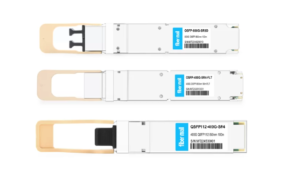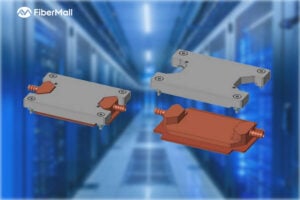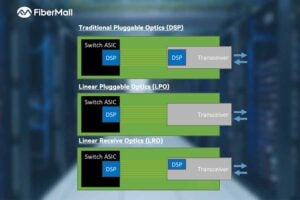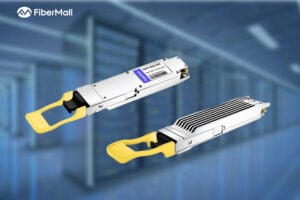- Catherine

FiberMall
Answered on 9:02 am
The difference between 100G-BIDI and 100G-SR1.2 is mainly in the number of optical lanes and the modulation solution. 100G-BIDI uses two optical lanes, one for each direction, over a duplex LC multi-mode fiber. 100G-SR1.2 uses four optical lanes, two for each direction, over the same fiber. 100G-BIDI uses NRZ (Non-Return-to-Zero) modulation, which means each bit is encoded as a single symbol. 100G-SR1.2 uses PAM4 (Pulse Amplitude Modulation) modulation, which means each symbol encodes two bits. PAM4 enables higher data rates with lower baud rates, but also introduces more noise and complexity. Both 100G-BIDI and 100G-SR1.2 are compliant to IEEE802.3bm 100GBASE-SR4 standard. The main advantage of 100G-BIDI is that it can reuse the existing 40G-BIDI infrastructure and reduce the fiber cabling cost. The main advantage of 100G-SR1.2 is that it can interoperate with 400G-SR4.2 and provide a future-proof solution for higher bandwidth demand.
Another difference between 100G-BIDI (100G-SRBD) and 100G-SR1.2 is the FEC (Forward Error Correction) used. 100G-BIDI (100G-SRBD) modules have been widely deployed for 100G operation over duplex MMF and use a FEC implementation that was developed prior to the IEEE standardization of KP-FEC for 50G PAM-4 based modules. Because of the differences in FEC implementation, 100G-SRBD and 100G-SR1.2 modules are not interoperable with each other.
People Also Ask
Comprehensive Guide to AI Server Liquid Cooling Cold Plate Development, Manufacturing, Assembly, and Testing
In the rapidly evolving world of AI servers and high-performance computing, effective thermal management is critical. Liquid cooling cold plates have emerged as a superior solution for dissipating heat from high-power processors in data centers and cloud environments. This in-depth guide covers everything from cold plate manufacturing and assembly to development requirements
Unveiling Google’s TPU Architecture: OCS Optical Circuit Switching – The Evolution Engine from 4x4x4 Cube to 9216-Chip Ironwood
What makes Google’s TPU clusters stand out in the AI supercomputing race? How has the combination of 3D Torus topology and OCS (Optical Circuit Switching) technology enabled massive scaling while maintaining low latency and optimal TCO (Total Cost of Ownership)? In this in-depth blog post, we dive deep into the
Dual-Plane and Multi-Plane Networking in AI Computing Centers
In the previous article, we discussed the differences between Scale-Out and Scale-Up. Scale-Up refers to vertical scaling by increasing the number of GPU/NPU cards within a single node to enhance individual node performance. Scale-Out, on the other hand, involves horizontal scaling by adding more nodes to expand the overall network scale, enabling
OCP 2025: FiberMall Showcases Advances in 1.6T and Higher DSP, LPO/LRO, and CPO Technologies
The rapid advancement of artificial intelligence (AI) and machine learning is driving an urgent demand for higher bandwidth in data centers. At OCP 2025, FiberMall delivered multiple presentations highlighting its progress in transceiver DSPs for AI applications, as well as LPO (Linear Pluggable Optics), LRO (Linear Receive Optics), and CPO
What is a Silicon Photonics Optical Module?
In the rapidly evolving world of data communication and high-performance computing, silicon photonics optical modules are emerging as a groundbreaking technology. Combining the maturity of silicon semiconductor processes with advanced photonics, these modules promise higher speeds, lower power consumption, and reduced costs. This in-depth guide explores the fundamentals, principles, advantages, industry
Key Design Principles for AI Clusters: Scale, Efficiency, and Flexibility
In the era of trillion-parameter AI models, building high-performance AI clusters has become a core competitive advantage for cloud providers and AI enterprises. This article deeply analyzes the unique network requirements of AI workloads, compares architectural differences between AI clusters and traditional data centers, and introduces two mainstream network design
Related Articles

800G SR8 and 400G SR4 Optical Transceiver Modules Compatibility and Interconnection Test Report
Version Change Log Writer V0 Sample Test Cassie Test Purpose Test Objects:800G OSFP SR8/400G OSFP SR4/400G Q112 SR4. By conducting corresponding tests, the test parameters meet the relevant industry standards, and the test modules can be normally used for Nvidia (Mellanox) MQM9790 switch, Nvidia (Mellanox) ConnectX-7 network card and Nvidia (Mellanox) BlueField-3, laying a foundation for

Comprehensive Guide to AI Server Liquid Cooling Cold Plate Development, Manufacturing, Assembly, and Testing
In the rapidly evolving world of AI servers and high-performance computing, effective thermal management is critical. Liquid cooling cold plates have emerged as a superior solution for dissipating heat from high-power processors in data centers and cloud environments. This in-depth guide covers everything from cold plate manufacturing and assembly to development requirements

Unveiling Google’s TPU Architecture: OCS Optical Circuit Switching – The Evolution Engine from 4x4x4 Cube to 9216-Chip Ironwood
What makes Google’s TPU clusters stand out in the AI supercomputing race? How has the combination of 3D Torus topology and OCS (Optical Circuit Switching) technology enabled massive scaling while maintaining low latency and optimal TCO (Total Cost of Ownership)? In this in-depth blog post, we dive deep into the

Dual-Plane and Multi-Plane Networking in AI Computing Centers
In the previous article, we discussed the differences between Scale-Out and Scale-Up. Scale-Up refers to vertical scaling by increasing the number of GPU/NPU cards within a single node to enhance individual node performance. Scale-Out, on the other hand, involves horizontal scaling by adding more nodes to expand the overall network scale, enabling

OCP 2025: FiberMall Showcases Advances in 1.6T and Higher DSP, LPO/LRO, and CPO Technologies
The rapid advancement of artificial intelligence (AI) and machine learning is driving an urgent demand for higher bandwidth in data centers. At OCP 2025, FiberMall delivered multiple presentations highlighting its progress in transceiver DSPs for AI applications, as well as LPO (Linear Pluggable Optics), LRO (Linear Receive Optics), and CPO

What is a Silicon Photonics Optical Module?
In the rapidly evolving world of data communication and high-performance computing, silicon photonics optical modules are emerging as a groundbreaking technology. Combining the maturity of silicon semiconductor processes with advanced photonics, these modules promise higher speeds, lower power consumption, and reduced costs. This in-depth guide explores the fundamentals, principles, advantages, industry

Key Design Principles for AI Clusters: Scale, Efficiency, and Flexibility
In the era of trillion-parameter AI models, building high-performance AI clusters has become a core competitive advantage for cloud providers and AI enterprises. This article deeply analyzes the unique network requirements of AI workloads, compares architectural differences between AI clusters and traditional data centers, and introduces two mainstream network design
